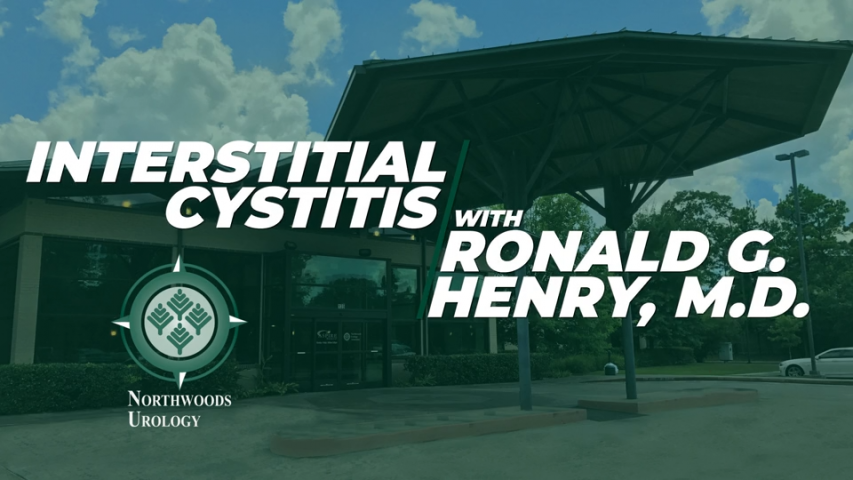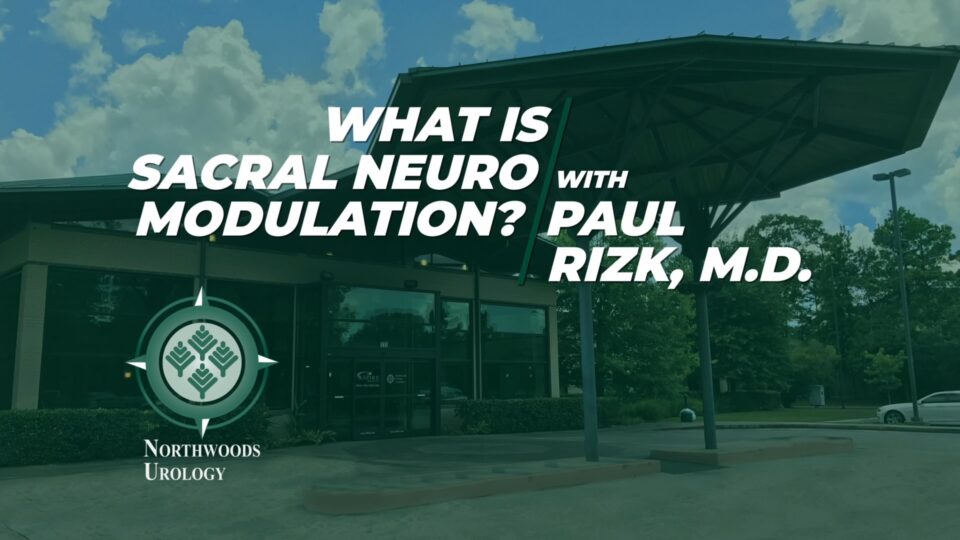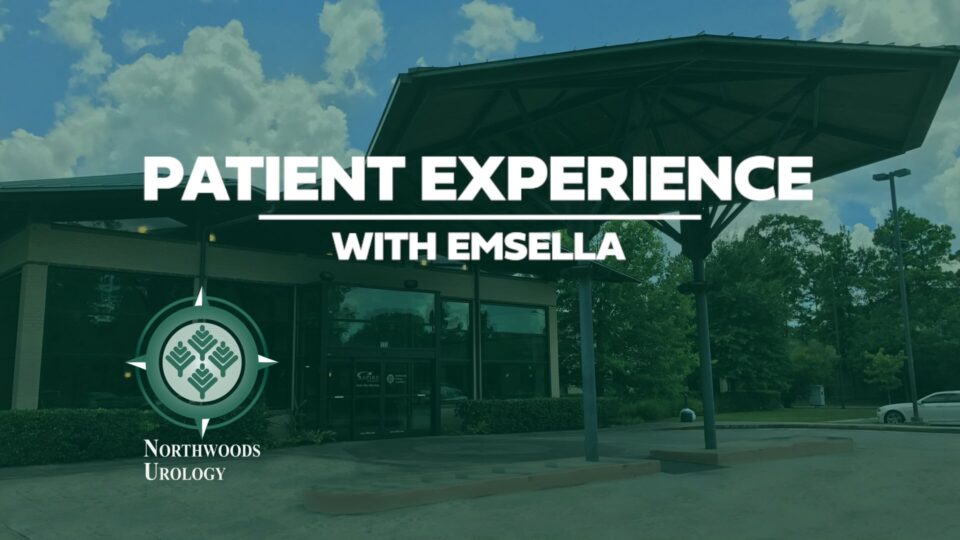Transcript of Video
Hello, I’m Dr. Ron Henry of Northwoods Urology of Texas. Today we’re going to talk about Interstitial Cystitis commonly referred to as IC.
Symptoms might also be referred to as painful bladder syndrome or chronic pelvic pain syndrome. The characteristics of IC are urinary frequency, urgency, and bladder pain. Most typically, when patients have a full bladder, the painful urination is not so common, and neither is blood in the urine or hematuria.
IC is often misdiagnosed as Urinary Tract Infection, and many patients come to the office for evaluation of IC and have made the comment that they’ve been taken Been given antibiotics every time they go see their primary doctor and that either is not helpful or their urine is sent off for urine culture, and there are no bacteria. IC is not related to any type of bladder infection. It is an inflammatory condition, but not an infection.
The important thing about a patient with suspected IC is to do a thorough history and physical exam. As far as history is concerned, we want to know how often they urinate. Do they have urinary urgency, and specifically do they have pain, most likely that occurs when the bladder is full? Patients often void frequently because they don’t want their bladder to get full. Voiding seems to relieve some of their discomforts, but this is a very debilitating disease for some patients.
It’s often associated with other conditions such as reflux, allergy issues, bowel issues. And I think it’s… Although there’s not necessarily a cause and effect, as far as examination, we’re trying to make sure that there’s not any abdominal pain we want to, sometimes we’ll do a pelvic exam just to make sure that their anatomy is normal. Urinalysis is very important at the beginning of treatment, just to know that they do not have a Urinary Tract Infection. As far as treatment options, early on we try to identify dietary triggers. We give patients a pretty thorough diet list and ask them to try to look for what things might trigger symptoms for them. There is a product on the market called Prelief.
Prelief is an over-the-counter supplement that can be used to reduce food acidity, which is an irritant to the bladder. Common foods that cause problems with IC are caffeine, alcohol, citrus-type products that acidify the urine, chocolate is considered a problem, tomato products for some people, and ironically, cranberry juice. Many people that have bladder problems think cranberry is the solution. Unfortunately, it is not the solution for IC patients and actually aggravates the symptoms.
So diet management early on, and behavior modification as to what they’re drinking, and how they’re drinking, and what foods they’re eating. Beyond diet therapy, management of stress, we often will initiate some type of medication. The diagnosis of IC is often based on symptoms alone, but there are other ways to try to confirm the diagnosis. We don’t, unfortunately, there’s not a urine test, or blood test, or something that’s going to diagnose IC. If we’re trying to confirm a diagnosis, oftentimes we’ll do a cystoscope or cystoscopy to look in the bladder, make sure there are not other problems that might be responsible for the symptoms, such as a bladder polyp or a bladder tumor. If we do get to the point of doing a cystoscope, oftentimes we’ll perform with that hydrodistension of the bladder meaning filling the bladder to maximum capacity.
That procedure alone for IC patients is generally not done in the office because it would be too uncomfortable. Oftentimes we’ll do that procedure as an outpatient surgery center under anesthesia. When the bladder is distended, we drain the bladder and look for various findings that would confirm the diagnosis. If we see something in the bladder, that is called a Hunner’s ulcer, cauterization of that part of the bladder is often very beneficial. Sometimes we can get therapeutic benefits from doing a hydrodistension. Although, certainly I can’t promise patients that that’s likely to occur. If we’ve confirmed the diagnosis of IC, and are going to initiate therapy, we will sometimes use a drug called Elmiron. The actual pathology for IC is we normally have a mucus coating for our bladder lining and in patients with IC, there are gaps in that coating, And so there are raw surface areas in the bladder that are irritated by concentrated urine.
Another factor related to IC is that they tend to have a higher number of Mast cells, M-A-S-T cells. That’s part of our allergic and immune response, and mast cells release histamine, and histamine irritates the bladder as well. So as far as treatment options the Elmiron is designed to try to restore the bladder lining and its mucus, protective coating. It’s often, however, something that may take several months to be effective. We typically will start patients with IC on an anti-histamine. The one I use most commonly is hydroxyzine. That’s usually given in the evening. Some people find that a bit sedating, and so we typically give it at night time. Another over-the-counter antihistamine that sometimes as effective as Zyrtec.
So I often encourage patients to get Zyrtec for daytime use, if they can tolerate it. If the patients are having a fair amount of pain that’s related to their IC, we’ll often use a drug called Amitriptyline. Amitriptyline is an old-fashioned antidepressant. It is not a pain medication. Pain medications are generally not effective for IC patients, but amitriptyline is a pain blocker, so to speak, it decreases the perception of pain and often is very beneficial for these patients. Treatment for IC patients is really quite variable. I think as much as any other problem, you really have to individualize treatment for your patients, and really pick and choose in terms of medication.
Some patients respond very well to pelvic floor physical therapy. And so I think you want to have a tailored approach. I try not to just pile a bunch of medicine on right off the bat. I think we try to be selective about picking and choosing with each patient and try to avoid triggers that are gonna make their symptoms worse.
If you’re having problems with urinary frequency and urgency associated with bladder pain, and feel like that interstitial cystitis might be a possibility, please come to Northwoods Urology of Texas for evaluation and appropriate treatment. Almost always, we can improve your situation.




